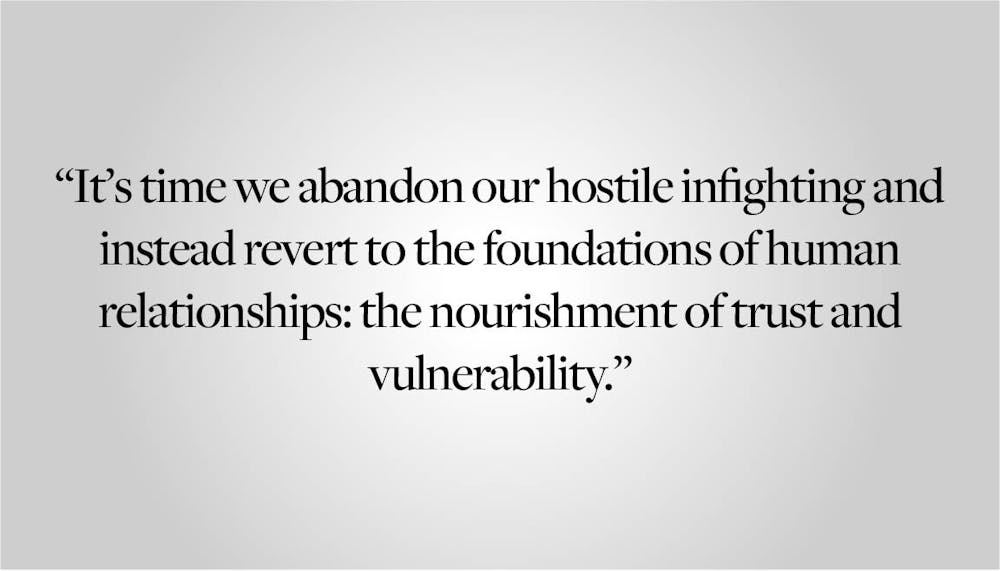In an age of incessant inequities — with racism, misogyny and homophobia all on the rise — America is facing a severe trust deficit. Many people feel unprotected and unrepresented by the government and the institutions meant to take care of them. Ultimately, this depleted social and institutional trust exacerbates our divisions, creating a reinforcing cycle of decaying trust. Systemic issues demand a whole-of-society response — from the arts to the academy, and Congress to classrooms. To mobilize that response, we have to prioritize restoring the confidence in institutions that we’ve lost.
Trust is ubiquitous — so much of human behavior is determined by a decision to instill trust in a company, institution, or person. We trust our Uber driver to take us to our destination safely. We trust the bank to store our money (with a fear-easing guarantee from the federal government). Ideally, we would trust news outlets to give us accurate, objective reports of world events. By putting faith in each other and our social structures, we build a network of reliability and vulnerability, bound by our belief in one another’s compliance with social norms. Trust allows us to collaborate with each other and mobilizes our participation in society.
Without it, we foster a culture of apprehension and alienation, which defines our state of affairs today — we lack basic trust. This isn’t necessarily unfounded. We see police brutality, gun violence, corporate fraud and sexual assault often going unaddressed, eroding our belief that the authorities and people around us truly value our well-being. And marginalized Americans in particular express extreme sentiments of alienation.
How do we cultivate a society in which we trust each other? A reported 71% of adult survey respondents believe we are less confident in each other than we were 20 years ago. Many of them attribute this decline in social trust to a rise in polarization and greed. If we don’t trust our neighbors, we can’t expect to begin to challenge the inadequacies in our communities or function as a cohesive unit. Without trust in our peers, we are less likely to innovate, take the risk to propose new ideas and collaboratively devise solutions for our nation’s issues. To create stronger, more effective social activism, we need to build receptive teams that are committed to open and empathetic communication. In practice, this means accepting and honoring each other’s mistakes, failures and diversity of opinions.
Our generation is in large part defined by our intolerance for injustice. We believe we have the social power to actually delegitimize systems of governance that do not earn our trust. We can’t just tear these systems down, though — we also need to think about how we can reform them. It’s easy to point out the flaws in corrupt institutions, but it is only by putting our heads together and collaborating with their leaders that we can re-imagine alternative forms of governance that rely on transparent networks of trust.
Ultimately, repairing the erosion of social trust is critical for the health and well-being of our society. The process to rebuild it will be long, which is why we must start now. To catalyze a resurgence in social trust, we have to start suspending our negative doubts and judgments of others and commit to making the conscious, active choice to trust again. If we can open ourselves back up to the world then we, too, will be trusted by others. And, once these networks are re-opened, it is our responsibility to nourish and sustain them through transparent and honest behavior. While we can hide behind our disillusionment with our nation and its unsatisfactory response to injustice, our anger is not enough. We all — citizens, corporate leaders and government officials — have to commit to practicing accountability, fairness and empathy in all of our social encounters. It’s time we abandon our hostile infighting and instead revert to the foundations of human relationships: the nourishment of trust and vulnerability.
Yael Wellisch ’26 can be reached at yael_wellisch@brown.edu. Please send responses to this opinion to letters@browndailyherald.com and other op-eds to opinions@browndailyherald.com.
Yael is the senior editor of opinions of The Herald's 135th editorial board. She previously served as an opinions editor and a member of the Editorial Page Board. She is from Washington, D.C. and studies history and international and public affairs.





